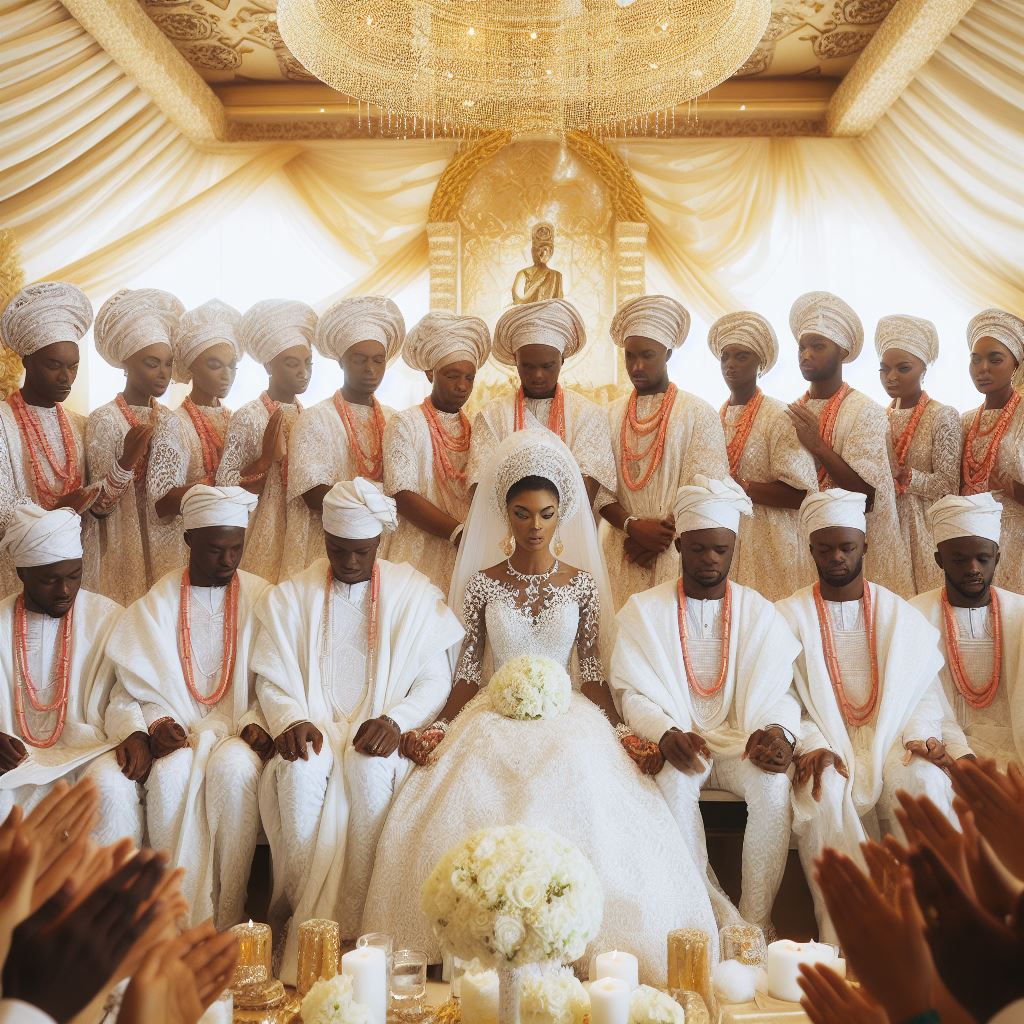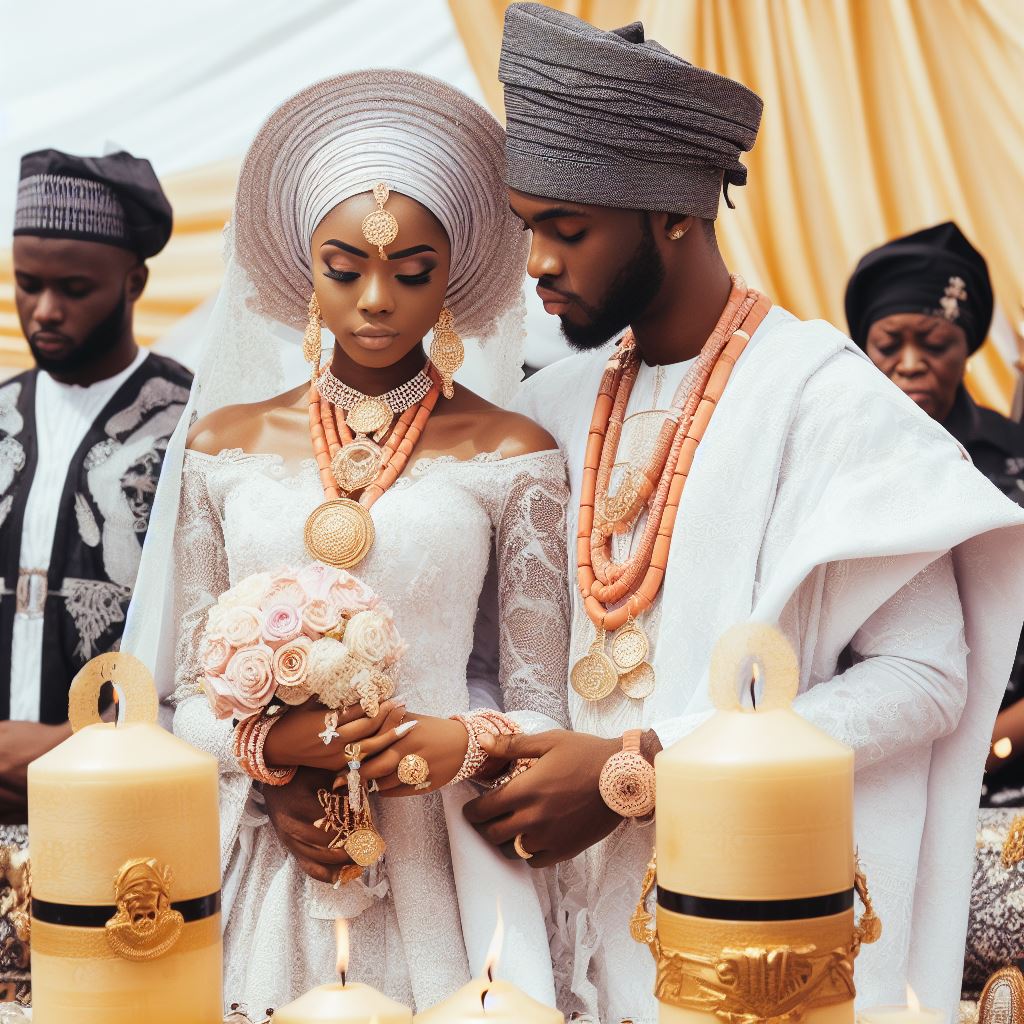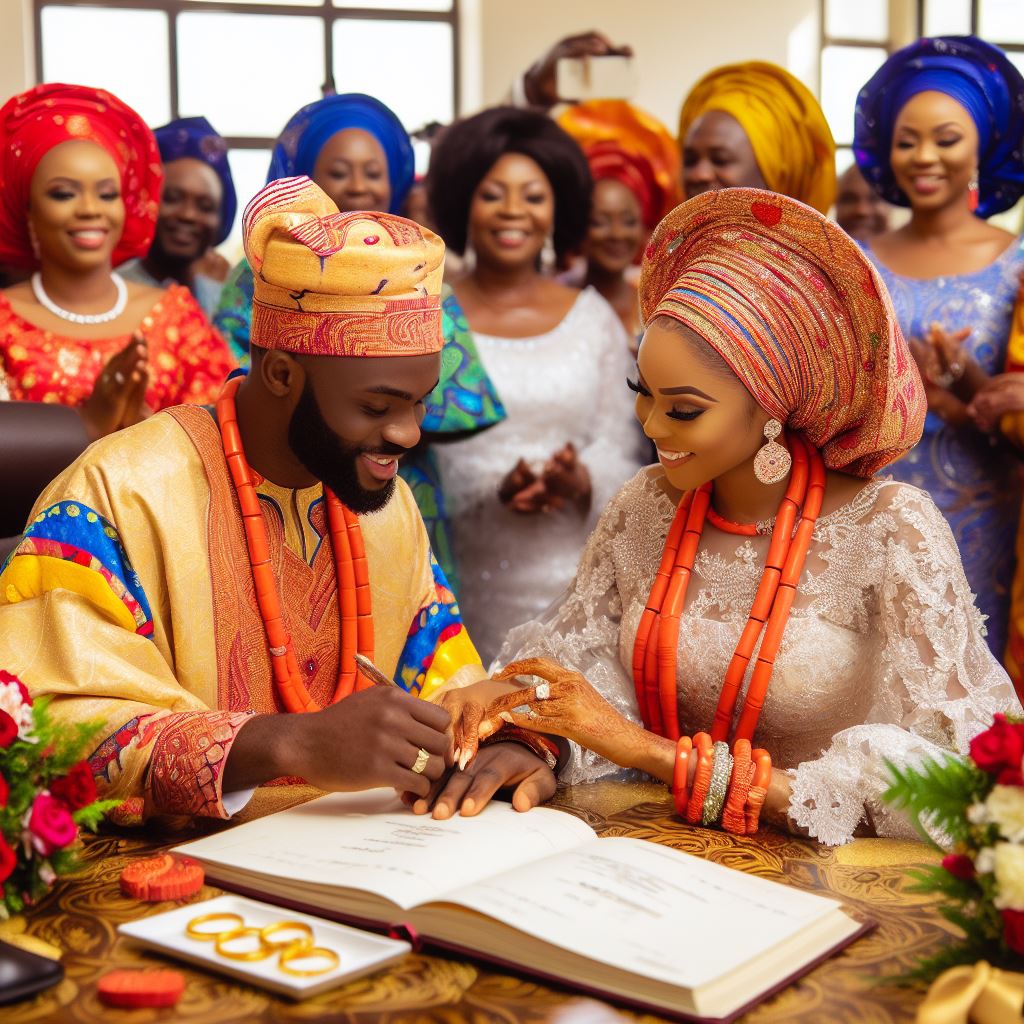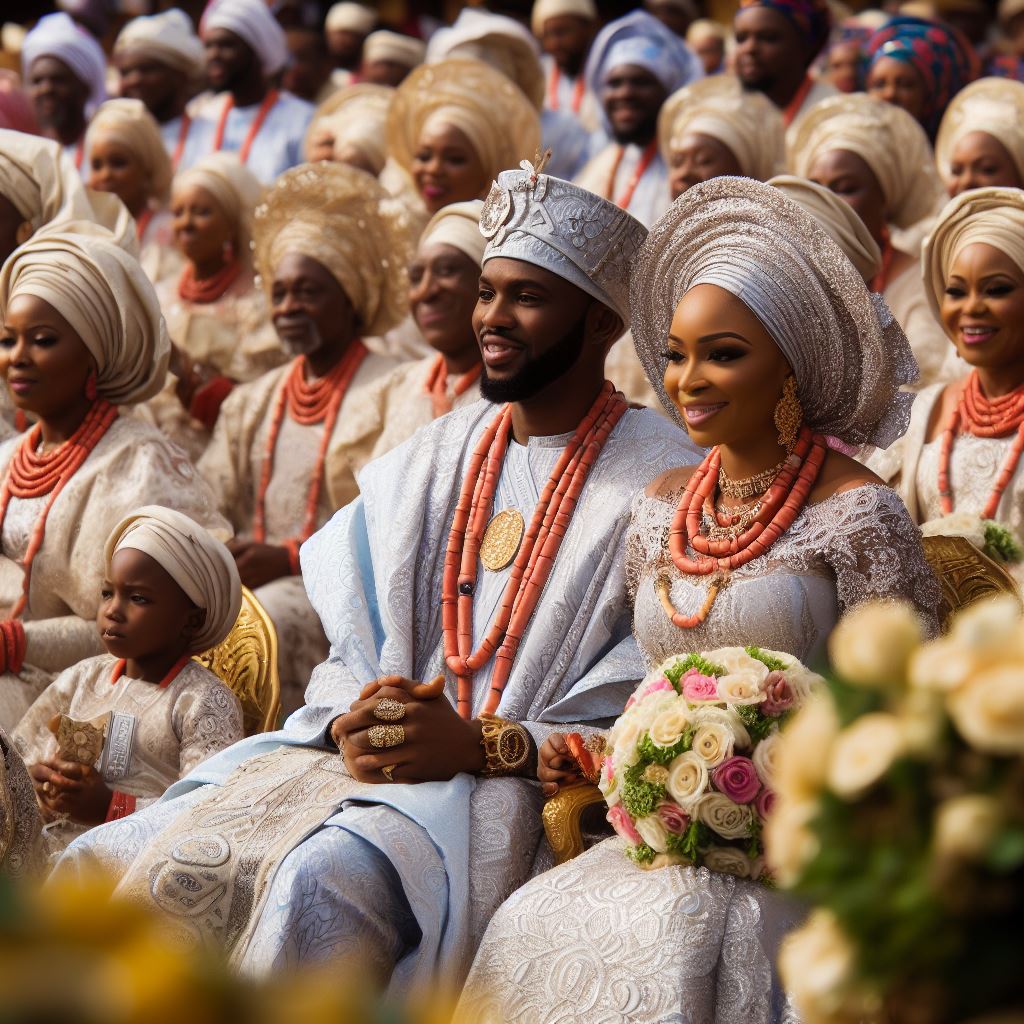Introduction
Marriage in Nigeria is a significant social institution with deep cultural roots.
This section aims to provide background information on marriage in Nigeria and present a brief overview of the legal and traditional perspectives on the topic.
Marriage holds immense importance in Nigerian society. It is not merely a union between two individuals but also a merging of families and clans, carrying cultural and economic significance.
In Nigeria, marriage customs and traditions vary across different ethnic groups.
However, both legal and traditional perspectives exist.
From a legal perspective, the Marriage Act of 1990 regulates formal marriages in Nigeria.
This act outlines the requirements, processes, and legal rights and responsibilities of couples.
Formal marriages require a marriage license, conducted by a recognized marriage registry.
In contrast, cultural customs and practices deeply root traditional marriages.
Traditional ceremonies can involve elaborate rituals, dowry payments, and the involvement of family elders.
The community recognizes these marriages, even though they might lack the same legal standing as formal marriages.
The legal perspective emphasizes the importance of official registration and compliance with legal procedures, ensuring legal rights and protection for couples.
In contrast, the traditional perspective highlights the cultural significance and community acceptance of marriage, emphasizing the importance of customs and traditions.
Understanding the legal and traditional perspectives on marriage in Nigeria is essential to have a holistic view of this institution.
Throughout this blog, we will explore the similarities, differences, and societal impact of these perspectives in more detail.
Read: The Stigma of Seeking Marriage Counseling in Nigeria: Breaking Myths
Legal Perspective on Marriage in Nigeria
Definition of marriage according to Nigerian law
In Nigerian law, marriage is defined as the voluntary union between a man and a woman.
Legal requirements for marriage registration
For a marriage to be legally recognized in Nigeria, it must be registered with the appropriate authorities.
Types of recognized marriages in Nigeria
1. Civil marriages
Civil marriages are formalized under the Marriage Act and require a marriage certificate.
2. Customary marriages
Customary marriages are recognized under customary law and have their own specific requirements.
3. Islamic marriages
Islamic marriages are governed by Islamic law and have their own rules and procedures.
Process of obtaining a marriage certificate
To obtain a marriage certificate in Nigeria, couples must apply to the appropriate marriage registry and provide necessary documents.
Rights and responsibilities of spouses under Nigerian law
Under Nigerian law, spouses have rights such as the right to maintenance, inheritance, and property ownership.
Read: The Evolution of Marriage Views among Nigerian Youth
Traditional Perspective on Marriage in Nigeria
Overview of traditional marriage customs and practices
- Traditional marriages in Nigeria vary across ethnic groups, each having unique customs and practices.
- These customs often involve elaborate rituals, ceremonial exchanges, and the endorsement of family elders.
- Traditional marriage ceremonies are considered sacred and are deeply rooted in cultural traditions.
Importance of cultural and family ties in traditional marriages
- Traditional marriages are seen as a way to preserve cultural heritage and strengthen family bonds.
- They serve as a platform for celebrating and transmitting cultural values and norms to the next generation.
- Family approval and involvement play a crucial role in the success and acceptance of a traditional marriage.
Different marriage customs across ethnic groups in Nigeria
Igbo traditional marriage customs
Involves bride price payment, traditional blessings, and ceremonial rites to unite the families.
Yoruba traditional marriage customs
Showcases a blend of vibrant cultural displays, gift exchanges, and a formal introduction ceremony.
Hausa traditional marriage customs
Emphasizes Islamic customs, dowry payment, and the involvement of Islamic clerics in the marriage process.
Role of traditional ceremonies in Nigerian weddings
- Traditional ceremonies are an essential part of Nigerian weddings, preceding the church or court wedding.
- They provide opportunities for families to gather, display cultural attires, and showcase traditional dances.
- These ceremonies foster unity, love, and mutual respect among family members and the larger community.
Significance of dowry and bride price in traditional marriages
- Dowry and bride price have deep cultural and symbolic significance in traditional Nigerian marriages.
- They represent the groom’s commitment and ability to take care of the bride.
- Financial contributions are also seen as a means to strengthen family ties and ensure stability in the union.
Traditional perspectives on marriage in Nigeria reflect the rich cultural diversity present in the country.
These customs and practices not only contribute to the uniqueness of Nigerian weddings but also serve as a foundation for preserving cultural heritage.
By embracing and valuing traditional marriage customs, Nigerians honor their ancestry and maintain strong family ties.
While legal perspectives are important in recognizing and protecting the rights of individuals, traditional viewpoints offer a deeper understanding of the cultural fabric that weaves Nigerian society together.
Both legal and traditional perspectives on marriage in Nigeria contribute to the complex tapestry of the nation’s identity.
They coexist, shaping the marital landscape and allowing Nigerians to navigate the intricacies of love, commitment, and familial bonds in diverse ways.
It is through the integration of these perspectives that Nigeria maintains its vibrant and culturally rich marriage traditions.
Read: Incorporating Religious Blessings in Nigerian Wedding Wishes

Comparing the Legal and Traditional Perspectives
Differences in marriage requirements and procedures
- The legal perspective imposes strict requirements such as age limits and consent.
- Traditional marriages focus on cultural and religious practices without stringent legal regulations.
Contrast in legal recognition and societal acceptance
- Legal marriages are recognized and protected by the state, providing legal rights and benefits.
- Traditional marriages may not have legal recognition, leading to uncertainty and lack of legal protection.
- Societal acceptance of legal marriages is higher due to formal recognition and adherence to legal frameworks.
- Traditional marriages may face skepticism, prejudice, and challenges in societal acceptance.
Impact of modernization and globalization on traditional marriages
- Modernization and globalization have influenced traditional marriage practices, leading to adaptations.
- Increasingly, traditional marriages incorporate elements of the legal perspective to enhance legal recognition.
Challenges faced by couples who opt for traditional marriages in a legal system
- Couples in traditional marriages may face difficulties accessing legal rights and benefits provided by the legal system.
- Legal procedures, such as property rights and divorce, may not be adequately addressed in traditional marriages.
- Legal disputes involving traditional marriages can be complex as they require interpreting cultural customs and practices.
Benefits and drawbacks of both perspectives
- Legal perspective provides legal protections, rights, and benefits to couples, ensuring stability and security.
- Traditional perspective preserves cultural heritage and values, fostering a sense of identity and belonging.
- Drawbacks of the legal perspective include the potential for bureaucracy and rigidity in marriage procedures.
- Traditional perspective may lack legal safeguards and may not provide equal rights to all individuals.
- Both perspectives offer unique advantages and challenges, requiring a balance between preservation and progress.
Read: Financial Implications of Divorce under the Nigerian Marriage Act
Conclusion
We have explored the legal and traditional perspectives on marriage in Nigeria.
The legal perspective highlights the importance of the Marriage Act, which governs the legal validity of marriages in Nigeria.
On the other hand, the traditional perspective emphasizes the cultural practices, rites, and customs associated with marriage.
Understanding both perspectives is crucial in Nigerian society as it allows individuals to navigate the complexities of marriage.
Individuals can ensure legal recognition and community acceptance of their unions by acknowledging and respecting both the legal and traditional aspects of marriage.
It is important to note that there may be potential future changes to marriage practices in Nigeria.
As society evolves and modernizes, there may be a shift towards a more harmonious integration of legal and traditional perspectives.
Promoting education and dialogue can enable Nigerians to honor and value both perspectives in marriage for the future.
In review, the legal and traditional perspectives on marriage in Nigeria provide a framework for individuals to engage in meaningful unions.
By appreciating both perspectives, we can foster a society that embraces the diversity and richness of Nigerian marriages.




